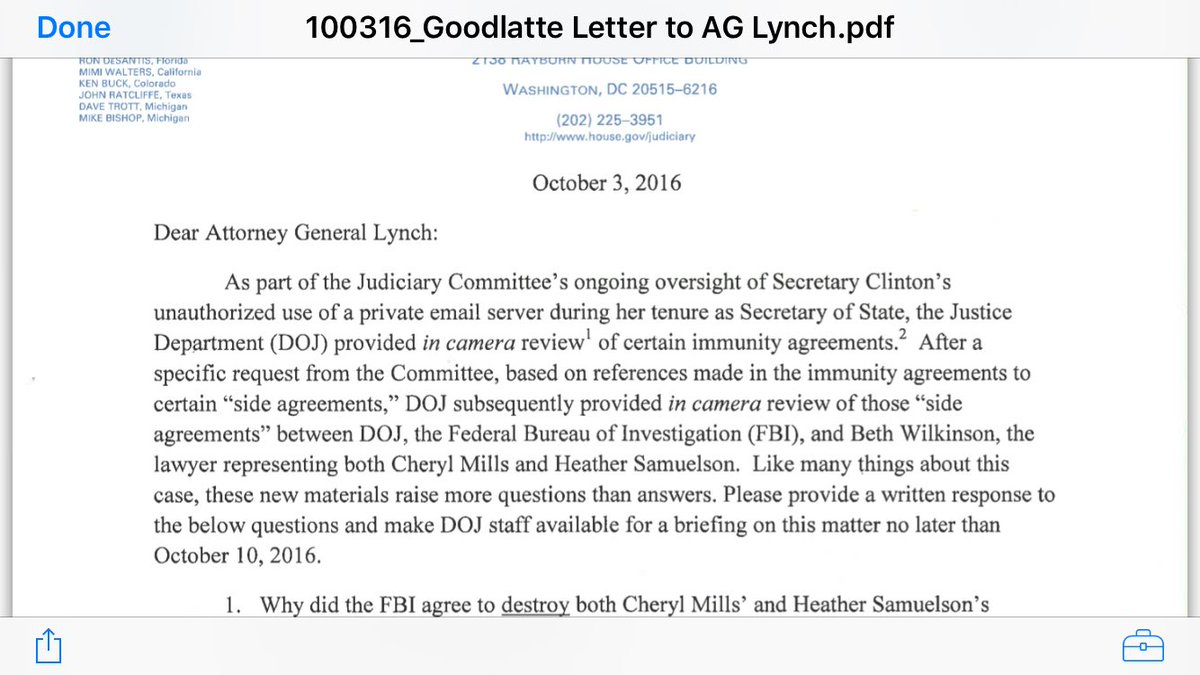Note: to destroy ‘both’ laptops. BREAKING from Catherine Herridge: FBI made side deals with 2 HRC associates to “destroy” their laptops after inspecting them.
On Wednesday, September 28, 2016, Director James Comey testified before the House Judiciary Committee at an oversight hearing on the Federal Bureau of Investigation. At the hearing, members of the House Judiciary Committee pressed Director Comey on his recommendation and the Department of Justice’s decision to not prosecute Secretary Clinton for mishandling classified information through private email servers.
Background:
• On July 5, 2016, Director Comey announced that the FBI does not recommend criminal charges against former State Department Secretary Hillary Clinton, even though federal law criminalizes mishandling classified information with “gross negligence.” Following his announcement, House Judiciary Committee Chairman Bob Goodlatte (R-Va.) and over 200 members of Congress sent a letter to Director Comey pressing for more information regarding the many questions surrounding his recommendation.
• On July 11, 2016, Chairman Goodlatte and House Oversight and Government Reform Committee Chairman Jason Chaffetz (R-Utah) requested that the Department of Justice open an investigation into whether Secretary Clinton committed perjury and made false statements when testifying under oath before Congress. Contrary to statements she made before the House Select Committee on Benghazi hearing in October 2015, Secretary Clinton sent and received emails that were marked classified at the time; her lawyers did not read each email in her personal account to identify all the work-related messages; she used several different servers and numerous devices to send and receive work-related emails; and she did not provide all of her work-related emails to the Department of Justice.
Hearing Takeaways:
• At the hearing, Director Comey defended the FBI’s conclusion of its investigation into Secretary Clinton, but new information casts serious doubts about whether the decision to not prosecute Hillary Clinton was made impartially.
• For example, Cheryl Mills, chief of staff and counselor to Secretary Clinton at the State Department, was granted immunity for the production of her laptop and was able to be in the room with Secretary Clinton while she was interviewed by the FBI. In all of his years in law enforcement, Director Comey admitted that he had never heard of a potential witness representing a subject of an investigation during an interview with investigators.
• The FBI never considered electronically recording Hillary Clinton’s interview with the FBI despite the fact that the Deputy Attorney General issued a memo to all DOJ components encouraging them to do just that in such situations.
Key Videos:
House Judiciary Committee Chairman Bob Goodlatte (R-Va.) challenges the FBI’s conclusions in the Clinton investigation and presses Director Comey on Congress’ perjury referral and the immunity deals provided to key Clinton advisors:
“Hillary Clinton chose to send and receive Top Secret information over a personal, unsecure computer server housed in her various homes and once reportedly placed in a bathroom closet. These actions, without a doubt, opened these communications to hostile interception by our enemies and those who wish America harm …
“We, as Congress and the American people, are troubled how such gross negligence is not punished, and why there seems to be a different standard for the well-connected.”
Representative Trey Gowdy (R-S.C.), a former federal prosecutor, explains why Secretary Clinton should have been prosecuted:
“Intent is awfully hard to prove. Very rarely do defendants announce ahead of time ‘I intend to commit this crime on this date’ … So you have to prove it by circumstantial evidence. Such as whether or not the person intended to set up an email system outside the State Department; such as whether or not the person knew or should have known that his or her job involved handling classified information; whether or not the person was truthful about using multiple devices….
“The way to prove [intent] is whether or not someone took steps to conceal or destroy what they have done. That is the best evidence you have is that they knew it was wrong, that they lied about it.”
Representative John Ratcliffe (R-Texas) presses Director Comey about why Secretary Clinton was not charged with obstruction of justice:
“I want to make sure the record is clear about the evidence that you did not have [in the investigation]:
The FBI did not have the Clintons’ personal Apple server used for Hillary Clinton’s work emails …
An Apple MacBook laptop and thumb drive that contained Hillary Clinton’s email archives was lost …
Two blackberry devices provided didn’t have SIM cards or SD data cards …
13 Hillary Clinton personal mobile devices were lost, discarded, or destroyed with a hammer …
Various sever backups were deleted over time …
After the State Department, and my colleague Mr. Gowdy here notified Ms. Clinton that her records would be sought by the Benghazi Committee, copies of her emails on laptops of both of her lawyers were wiped clean with BleachBit …
After those emails were subpoenaed, Hillary Clinton’s email archives were also permanently deleted from the Platt River Network with BleachBit …
And also after the subpoena, backups of the Platt River server were manually deleted.
“Collectively this list screams obstruction of justice.”



 B
B